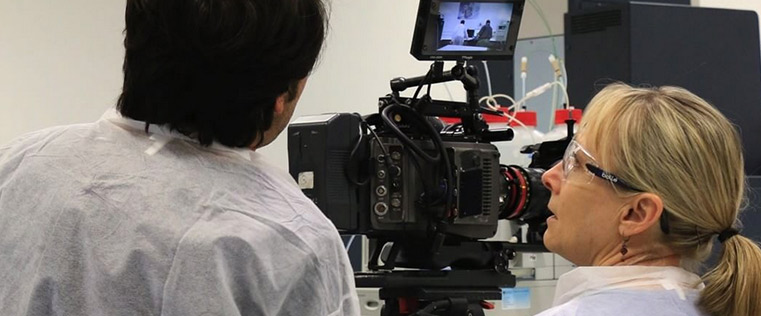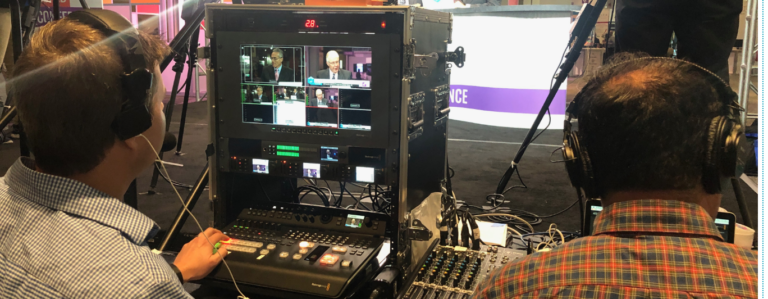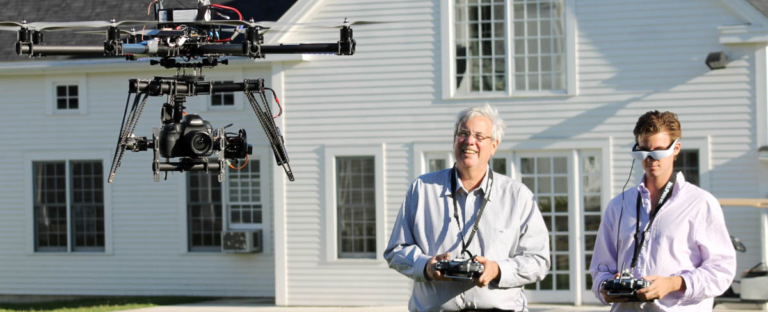What is a Video Producer and Do You Need One? What Marketers Need to Know
by Catie Foertsch
If you’ve got a video project and you’ve asked for proposals, chances are you’re seeing the words video producer. Here’s the information you need to understand what a video producer does, and whether you need one for your video project.
What is a video producer?
A video producer is the person in charge of making sure the video that gets produced is the video you want and need. They are responsible for every aspect of production, from concept through delivery.
What does a video producer do?
A video producer does a lot. Let’s walk through the phases of video production, and look at a producer’s role during each phase.
Pre-production
Pre-production means everything that comes before filming. That can include:
- Budgeting
- Concept development
- Script development
- Storyboarding
- Shot list
- Crew coordination
- Talent scheduling
- Specialty services (like auditioning actors, obtaining props, working with voice actors)
- Location scouting, booking and scheduling
- Graphics concept development
- Client communication
If your video project is relatively simple…
…a producer will do many or all of the pre-production tasks. By simple, I mean, for example, a two-minute video that’s a combination of corporate interviews and B-roll. The budget allows for one full day of filming, two days of editing, and basic graphics.
In this example, the producer would provide a budget for client approval, then work with the client to develop the concept and the script. Once the script is approved, the producer would build the storyboard and shot list. She’d schedule the crew and the location, and communicate this to the client, along with any pre-shoot information the client needs.
An example of a more complicated project…
…would be a series of six videos, each five minutes long, each including complex graphics, actors, a hired location, catering, rented lighting, special gear like a motorized slider, a drone with FAA-certified pilot, a 4k camera, and maybe even a dog.
For this size project, a producer needs help.
She will delegate many of the pre-production tasks, and manage her crew so that come shoot day, all is ready.
Production
Production means everything that happens at the video shoot, including:
- Load in
- Set preparation
- Camera set-up
- Makeup
- Teleprompter set-up
- Talent prepping and coaching
- Filming per shot list
- Continuity
- Catering
- Gear tear-down
- Load out
During production, most of the physical work is done by the video crew.
It’s the producer’s job to provide oversight, interface with the client, conduct interviews, and make sure everything happens as it should.
Post-production
Post-production refers to everything that happens after the video shoot. Usually, it means making sure the footage is properly ingested and backed up, then supervising the edit, working with the client on revisions, and making sure the final files are delivered in the appropriate format.
Most producers are also excellent editors, and can edit the project themselves if necessary.
What skills are important for producers?
Organizational skills
Video production is complicated, with lots to keep track of. A producer must have the skills and the systems to keep schedules, contacts, emails, documents, and more organized.
A background in production
A video producer needs to understand video production, and that means some familiarity with production elements such as cameras, lighting, green screens, teleprompters, etc. Editing skills are important – both an understanding of what good editing is, and facility with editing software. Basic understanding of and proficiency with motion graphics and animation software like AfterEffects is a plus.
Problem-solving skills
Every video is different, and very often a video producer has to figure something out, whether it’s How are we going to get this shot? to How do we make this schedule work? to Where do we get a dog for this video?
Flexibility
Things don’t always go the way they’re supposed to. A producer needs the ability to come up with Plan B, often without much notice.
People skills
A producer works with people every day – clients, crew members, contractors, actors, vendors – and must be able to work comfortably with different personalities and different moods. Sometimes the client is anxious. Sometimes the talent is nervous. Sometimes the editor disagrees with the concept. In all situations, the producer must leave his own mood at the door so he can make sure the project doesn’t suffer because someone is having a rough day.
Creative skills
A video producer needs to translate a client’s idea – whether it’s fully formed and specific, or general and fuzzy – into a vision of what the video will look like.
Communication skills
Whether it’s helping a client understand and get excited about a creative vision, or conveying information to the video crew to get the necessary shot, communication skills are critical.
Storytelling skills
Every successful video tells a story, and a producer must be able to understand the story the client needs to tell, and then create a video that tells that story.
When do you need a video producer?
For most video projects, a producer is not optional – because you need someone who understands all aspects of video production to make sure your video comes out like you want and need it too.
When don’t you need a video producer?
Occasionally there are projects that don’t require a producer. These tend to be simple projects, like filming presentations, or live-streaming an event.
In these cases, you don’t need most of what a producer does, and your videographer can act as your producer. You’ll still need scheduling, a budget, file delivery, and maybe some basic editing, but your videographer can do these things for you.





